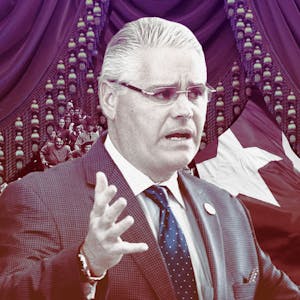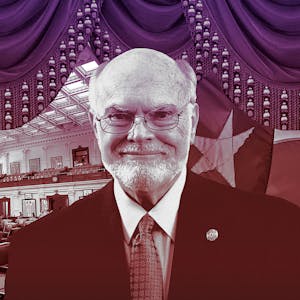Around the Texas Capitol this year, it wasn’t unusual to hear the 85th Legislature described as the worst anyone could remember. While we wouldn’t go that far, this session had more than its fair share of dispiriting moments. Quite a few of those came courtesy of the bathroom bill and the misleading public-safety rhetoric its supporters used to justify restrictions on where transgender Texans could relieve themselves. The bill died in the House, but the issue hasn’t gone away. Lawmakers also took a simple bill to ensure that Texas cities comply with federal immigration requests and amended it to allow police to inquire about immigration status when they merely detain someone. Democrats argued that the “show me your papers” provision could lead to racial profiling of Latinos, and police chiefs said it would result in an increase in crime. On the other hand, the Legislature did provide a major funding increase—$509 million—to the Child Protective Services department, which desperately needed it.
But otherwise, not much got done. This Legislature passed the fewest bills in years, and while some might argue that’s a good thing, the biggest issue facing Texas—the crumbling school-finance system—went unaddressed. Instead of action, we got grandstanding over school vouchers, property taxes, and, as ever, abortion.
Most bills fell victim to a standoff between the House and Senate. The differences between the chambers have never seemed greater, mostly because the two men leading those chambers represent opposing sides of a divided Republican party. Speaker Joe Straus led a moderate, business-friendly coalition in the House; Lieutenant Governor Dan Patrick steered the more right-wing Senate.
In February, we declared Patrick the state’s most influential politician, and much of what happened this session reinforced that view. It’s true that his three prized proposals—on bathrooms, property taxes, and vouchers—all failed to pass. But there’s no denying that Patrick controlled the narrative of the session. He bullied the Senate to bend to his will and deftly used the bully pulpit to dominate news coverage and pressure the House. In the end, his killing of certain must-pass bills forced a special session.
For his part, Straus played skillful defense against Patrick’s agenda, but he too failed to pass his top legislative priority, school-finance reform. He also lost control of his chamber during the sanctuary cities debate, which resulted in the “show me your papers” amendment.
Meanwhile, Greg Abbott was largely a nonpresence at the Capitol. You’d have to go back decades to find a governor who engaged less with lawmakers. Abbott waffled repeatedly on the bathroom bill. He did little to aid the sanctuary cities measure he wanted but then took credit for it during a Facebook Live bill signing at which none of the lawmakers who actually passed it were present. A question often heard around the Capitol: Why did Greg Abbott want to be governor?
In the end, this session featured too much noise and too little done to improve the lives of Texans. All of which made compiling our biennial list of the best and worst legislators especially challenging. How do you judge a session in which so little was accomplished? Well, we talked to journalists, lobbyists, and many of the lawmakers themselves. We weren’t interested in ideology but rather who tried to solve problems and who created them. Politics is not just about conservatives and liberals, Republicans and Democrats. It’s about working cooperatively to make Texas a better place. That has been the standard for the Best and Worst list since its inception in 1973 and remains so four decades later.
The Best

Representative Byron Cook
Republican, Corsicana
Byron Cook sits in perhaps the Legislature’s hottest seat. He chairs the State Affairs Committee, which handles many of the most controversial bills. A moderate, business-friendly Republican, Cook has been a target of right-wing Republicans for years. They were none too thrilled with him this session, either.
Cook opposed the bathroom bill and gave a hearing in his committee to a weaker, compromise version that, like the original, didn’t pass. He also killed a bill that would have outlawed abortion. That preference for moderation is what earned him a spot on the Best list. Well, that and his ability, as the conscience of the House, to sway fellow lawmakers with moving speeches, a rare trait in the era of echo-chamber politics.
Cook’s words helped beat back an amendment to deny state assistance to abused and neglected children whose caregiver is an illegal immigrant, and he turned the House against an amendment to the late-term abortion ban that would have removed a key exemption for cases involving severe fetal abnormalities. Cook failed to persuade fellow Republicans to vote against the “show me your papers” amendment on the sanctuary cities bill, but we can hardly hold that against him. In general, his moderation, level-headedness, and genuineness helped prevent the session from becoming even more divisive than it already was.

Representative Sarah Davis
Republican, Houston
Sarah Davis was seemingly in the middle of everything this session. She was a key budget writer, heading the House panel on health and human services spending. She then helped negotiate the final budget, in which the House secured a few critical concessions from the Senate, including funding to compensate relatives who care for children in the foster care system. Davis also chaired the House investigations committee that looked into the misuse of state funds by the Texas Alcoholic Beverage Commission.
Davis took on several important public-health issues. She worked with Republican senator Joan Huffman to pass legislation to increase screening of new mothers for postpartum depression. She unsuccessfully attempted to pass an amendment to give foster children a vaccine to prevent cervical cancer. She also got upended by fellow Republicans in an effort to provide teen mothers birth control without parental consent. Texas leads the nation in the number of mothers under age eighteen who give birth to a second child. But addressing that problem proved too much for social conservatives in the House to stomach.
Davis is one of the few true moderates left in an increasingly strident Legislature. This session she once again proved herself knowledgeable, hardworking, and willing to occasionally break with her party’s ideology to do what’s best for the state. How refreshing is that?

Representative Dan Huberty
Republican, Houston
It’s hard to miss Dan Huberty. He’s one of the peacocks of the House, often dressing in brightly colored pastel suits that stand out in the crowd of black and charcoal threads. In recent sessions, his legislating hasn’t garnered quite as much attention as his attire. In 2011 we named Huberty rookie of the year, describing him as “self-assured, diligent, and willing and able to tackle tough issues.” But in the years that followed, his considerable potential went unrealized. This session, the old Huberty was back, and his reemergence couldn’t have come at a better time.
With the retirement of Jimmie Don Aycock, the Legislature lost its established expert on the infinitely complex way that Texas funds public schools. As chair of the Public Education Committee, Huberty stepped forward to fill the void.
He crafted a plan to increase the state’s share of funding for public schools by $1.6 billion, including additional money for transportation and the education of dyslexic children. The Senate, led by Patrick, scuttled the plan, but Huberty’s efforts were still impressive. School finance is perhaps the single most important issue facing the state—with a funding system in desperate need of reform—and Huberty not only took it on but built enough consensus to pass his bill through the House on a 134–16 vote. Huberty undoubtedly stood out this session and not just because of his suits.

Senator Joan Huffman
Republican, Houston
Joan Huffman has always shown great potential as a legislator. She’s smart, tough, and driven. Her failing had been her intransigence. As a former prosecutor, she seemed unwilling to move beyond representing only the interests of the Harris County district attorney’s office.
She remains an ardent advocate for prosecutors, but this year, in her fifth full session, she embraced a wider perspective, and the result was several impressive victories. The first was an overhaul of Texas’s voter ID law, in which she showed flexibility by agreeing with Democrats on a provision to require that prosecutors prove a person had intentionally lied on a voting affidavit before charging them with a crime.
In another show of bipartisanship, Huffman teamed with Senfronia Thompson to pass a bill increasing penalties for human trafficking and the promotion of prostitution. But her biggest accomplishment was serving as one of the chief negotiators and sponsors of desperately needed legislation to fix Houston’s ailing city pension systems.
We still heard some whispered complaints about Huffman, and she may always be the kind of lock-’em-up, tough-on-crime advocate that’s gone out of fashion even among Republicans. But this session she showed impressive growth as a lawmaker, putting her considerable talents to use passing important legislation for her constituents. We hope it’s a sign of things to come.

Representative Joe Moody
Democrat, El Paso
Joe Moody doesn’t have a long list of high-profile bills to his name. Perhaps his most notable piece of legislation this session—to establish harsher penalties for cruelty to animals—got hijacked in the House by abortion opponents who didn’t want penalties for animal cruelty to be stiffer than those for an illegal abortion (Moody’s original version of the measure eventually reached the governor).
But Moody’s contributions went beyond the bills he sponsored. Time and again, legislators and lobbyists praised Moody, especially for his intelligent and even-handed work as chair of the Criminal Jurisprudence Committee. Lobbyists told us that even when they lost in Moody’s committee, they felt like they had gotten a fair hearing. During floor debates, Moody helped to ferret out sections of bills that could have unintended consequences. When a scuffle broke out between Latino Democrats and Republican Matt Rinaldi on the session’s final day, Moody helped restore order by going to the back microphone to suggest that the matter be referred to the House investigating committee.
Moody isn’t flashy. His name doesn’t end up in many news stories. But behind the scenes, he’s the kind of sharp, fair-minded legislator who helps hold things together. When the Legislature, sometimes despite itself, actually does improve the lives of Texans, it’s because of members like Joe Moody.

Senator Robert Nichols
Republican, Jacksonville
In a legislative session dominated by talk of bathrooms and immigrants, it was easy to overlook the bill on overweight trucks that Robert Nichols passed. You probably didn’t see many headlines about it. But the measure could lead to billions of dollars in new manufacturing investment along the Texas coast.
At issue was how much weight Texas allows trucks to carry. The most common permit limits trucks to 84,000 pounds of cargo. The restrictions are intended to minimize the damage that trucks inflict on rural roads. The problem is that most shipping containers are typically much heavier. Without a change in state law, new manufacturing plants, particularly chemical plants, would likely be built in states that already allow heavier loads.
Nichols brought together corporations and policy experts last year to find a way to allow overweight trucks but also preserve roads. The result was a bill that will allow for trucks with additional axles and weight but also with antitipping technology and blind-side sensors. These measures will improve safety, Nichols says. And his bill restricts overweight trucks to within thirty miles of the coast and to roads designated for them by the Texas Department of Transportation. One chemical plant has already announced a major expansion on the Texas coast. Fostering compromise to solve a real-world problem is a good way to land on the Best list.

Representative Chris Paddie
Republican, Marshall
In most legislative years, the ride-sharing bill—which supplanted a patchwork of city ordinances with statewide regulation—would have been an afterthought on the Best list. But since hardly any major bills passed this session, we’re left with more minor measures, like the legislation favored by Uber and Lyft and the lawmaker who ably steered it through the process, Chris Paddie.
The two ride-sharing services had pulled out of Austin in 2016 after the voters imposed stringent regulations. As soon as the governor signed Paddie’s bill into law, Uber and Lyft announced a return to Austin, thrilling out-of-town music lovers and techies, not to mention conservative Republicans who enjoy nothing more than knocking around Texas’s most liberal city.
That wasn’t Paddie’s only success. He helped pass a bill requiring the state to give preference to U.S. steel and iron when constructing buildings, roads, and bridges. Paddie also worked to forge a compromise on the session’s most divisive topic, the bathroom bill. His moderate proposal would have limited the measure to public schools and made it voluntary for students who wanted privacy. The Senate rejected it as too weak, but Paddie’s efforts were still admirable.
We wish the leadership hadn’t chosen to largely ignore the state’s major issues. But that isn’t Paddie’s fault. You can only play the hand you’re dealt. And he played it well.

Representative Four Price
Republican, Amarillo
Walter Price IV, better known as Four Price, sometimes gets lost in the shuffle because he makes his work look easy. It’s not. As chair of the Public Health Committee, Price introduced more than a dozen bills to reform how Texas cares for those with mental illness, a historically neglected population. Probably the most significant was House Bill 10, which designated a state ombudsman to oversee access to behavioral health care and push insurance companies to cover treatment for mental health the same as they do physical ailments. It passed the House on a 130–13 vote, and the Senate sent the measure to the governor with only one dissention.
Another piece of his package would require magistrates to hold hearings early in the criminal process to divert some offenders with mental illness or intellectual disabilities from jail to the state mental-health system. He also sponsored a bill requiring school districts to develop tools to identify and help students with mental-health problems.
He did, however, pass a controversial measure to allow the placement of foster children in privately run group homes. Child-welfare advocates spoke against the bill, saying the state should move away from that kind of foster housing. Price countered that he was trying to ease the pressure on a strained system. On the whole, Price was one of the session’s most effective problem solvers.

Representative Matt Schaefer
Republican, Tyler
We know this is a controversial pick. Matt Schaefer is a divisive figure who chairs the Texas Freedom Caucus, a dozen libertarian-leaning Republican bomb throwers who have spent the past two sessions trying, and failing, to create chaos in the House. And some of them still seem more interested in killing bills than passing them (see the Worst list). Until very recently, the Freedom Caucus was isolated and ineffective.
But late in the session, things began to change. The Freedom Caucus hardliners, led by Schaefer, actually began to employ savvy legislative strategy. On the night of a crucial House deadline, they killed dozens of bills. For once, this wasn’t indiscriminate. They intentionally scuttled must-pass legislation, the demise of which gave Dan Patrick leverage to force a vote in the House on the bathroom bill.
Schaefer authored perhaps the session’s most controversial act: he stunned House leadership by attaching the “show me your papers” amendment to the sanctuary cities bill allowing law enforcement officers to ask the people they detain or arrest for proof of citizenship or legal residency.
Schaefer remains unpopular among liberals and even many Republicans, but the Freedom Caucus has become surprisingly effective. As the caucus leader, Schaefer has clearly learned how the game is played at the Capitol, and—for better or worse—he was surprisingly good at it this session.

Representative Senfronia Thompson
Democrat, Houston
Senfronia Thompson, known affectionately in the House as Ms. T, is a force of nature and a living argument against term limits. At 78, she’s the second-most-senior member of the House, having arrived in 1973. In recent years, she’s been one of the state’s fiercest advocates for combatting human trafficking. When members of the Freedom Caucus killed her bill mandating continuing education for cosmetologists to spot and report human trafficking, a righteous Thompson took to the House floor to call them out by name. “Wouldn’t you want somebody to rescue your child? How many of you in here want to help the pimp?” she said. “I don’t want to be a person who helps the pimp. I want to help the victim.”
When a version of the bathroom bill came to the House floor, Thompson delivered a powerful speech against discrimination, observing that when Barbara Jordan joined the Texas Senate, in 1967, she wasn’t allowed to use the members’ bathroom.
Thompson also showed that she can find common ground with Republicans on critical issues. She carried a grand-jury reform bill with Republican senator Dawn Buckingham, of Lakeway. Thompson also worked with GOP senator Bryan Hughes, of Mineola, on legislation to give nonviolent offenders a second chance in life by sealing their criminal records. In a session filled with too many talking points, Thompson delivered a passionate and substantive performance.
The Worst

Representative Briscoe Cain
Republican, Deer Park
We typically exempt freshmen from the Worst list. We usually forgive their trangressions, because they don’t know how the Legislature works. So just know that we tried. We tried really hard to give Briscoe Cain a pass. But he left us little choice.
When we asked Capitol insiders for Worst list suggestions, his name, almost universally, was the first one mentioned. During one floor debate, when a fellow legislator fell ill with a serious intestinal ailment, Cain objected to the usual procedure of granting the lawmaker an excused absence and called for a record vote. He was the only no vote. But one particular moment, during the budget debate on the House floor, best exemplifies Cain’s uninformed and belligerent performance this session. He offered an amendment to defund a state council that promotes palliative care. He called it a “death panel.” Under questioning from his colleagues, it became clear that Cain didn’t know that palliative care is the treatment of terminally ill people for pain and anxiety to ease their passing. He eventually withdrew his amendment, but not before he’d very nearly zeroed out funding for a good program without actually knowing what it does. Thankfully his colleagues saved him from himself in that instance. Unfortunately, there was no one to save the rest of us from Briscoe Cain.

Representative Dawnna Dukes
Democrat, Austin
Two of the swiftest ways for a lawmaker to land on the Worst list is not showing up for work and misleading your constituents. Dawnna Dukes has been guilty of both.
Dukes’s problems began after a 2013 car accident on Interstate 35 in which she was rear-ended. She has said that constant pain from her injuries caused her to miss 84 percent of the House’s votes during the 2015 session. But that was just the start. Two staff members claimed Dukes was paying them with taxpayer money while using them as nannies for her daughter. And local prosecutors began exploring a criminal case. After all that, it was baffling that Dukes decided to run for office again, but she did. During the 2016 campaign, as it became clear she might soon face indictments, Dukes promised that, if she were reelected, she’d resign before taking office.
But she reneged on that promise, and a week after being sworn in to her twelfth term, Dukes was indicted on two misdemeanor charges of misusing public funds for personal gain and thirteen felony counts of tampering with public records. (Dukes has said she’s innocent.) Meanwhile, she continued not showing up; she missed more record votes this session—905 as of May 26—than any other House member. We wish Dukes the best of luck with her health and her criminal case, but her East Austin constituents deserve better representation. Who can ever trust her again?

Representative Gary Elkins
Republican, Houston
Gary Elkins is a walking oxymoron: he is the chair of the Government Transparency and Operations Committee who spent the session killing transparency legislation.
The public’s access to information (or lack thereof) has been a pressing issue following recent state Supreme Court rulings that essentially exempted from disclosure any documents produced by nonprofits and corporations that do business with state or local governments. For the better part of a year, advocates for open government, journalists, and business executives worked on the issue. They came up with ways to keep birth dates for government employees on public records so watchdogs could better track corruption in government hiring. It was mostly for naught, because Elkins bottled up all open-government bills in his committee. Some may think sunshine is the best disinfectant, but Elkins believes, as he told journalists, that it can be bad for business.
So when you wonder whether a business got a sweetheart deal from your local government, think of Gary Elkins. If you wonder why no one discloses how much your city or public university paid for an entertainer or a speaker, think of Gary Elkins. If you wonder why no one can find out what the nonprofit contractors are doing to restore the Alamo, think of Gary Elkins. And if you wonder who the worst legislators from the 2017 session were, most definitely think of Gary Elkins.

Representative Jessica Farrar
Democrat, Houston
You know you’re irrelevant when you resort to filing a satirical bill. That’s probably why it rarely, if ever, happens. We’ve certainly seen bills in the Legislature that read like unintentional satire, but Jessica Farrar’s HB 4260—the so-called Man’s Right to Know Act—was the first time we can remember a Texas lawmaker deliberately filing a bill solely to make a rhetorical point.
Farrar’s legislation would have required that men endure “medically unnecessary” rectal exams and a 24-hour waiting period before they could receive vasectomies, colonoscopies, or Viagra prescriptions. It also proposed a $100 fine for “masturbatory emissions.” There were other provisions, but you get the idea. And the point is well taken. The Legislature has invaded women’s medical decisions by requiring that they receive a sonogram and be given the Woman’s Right to Know pamphlet before they can have an abortion.
Our quarrel is with her methods. Satire is a tool for comedians and outsiders. The whole point of being a legislator is that you work within the system. By engaging in such lampoonery, Farrar admitted her powerlessness to win over her colleagues or use the legislative process to her advantage (of the 41 bills she filed, only one reached the governor’s desk; she did sponsor four Senate bills that passed). If Farrar returns in 2019, we hope she’ll be a more effective advocate for women’s health and leave the satire to Stephen Colbert.

Senator Kelly Hancock
Republican, North Richland Hills
Pulling off an almost impossible feat, Kelly Hancock managed to anger Texas businesses and tea party groups this session with opportunism and vindictiveness.
When the Fort Worth Chamber of Commerce came out in opposition to the bathroom bill, Hancock resigned his membership. Then, in a public hearing on the measure, a skeptical Hancock ruthlessly grilled the president of the Texas Association of Business over the group’s estimates of economic damage from the bill, including the possible loss of the 2018 NCAA Final Four in San Antonio. But just four years ago, Hancock passed a bill to give state funding to such tournaments because they “encourage robust economic growth,” as he said at the time. The next day, still steaming from the bathroom bill hearing, Hancock wanted to ban a TAB lobbyist from appearing before his committee and only relented after his staff convinced him that the lobbyist simply wanted to testify about her personal problems with health insurance billing.
Meanwhile, after billionaire investor Warren Buffett had a private meeting with Dan Patrick, Hancock filed emergency legislation to benefit car dealerships in Texas owned by Buffett and passed the bill out of his committee within two days. The bill was killed only after tea party groups opposed the measure as corporate welfare. This session, it seems, Hancock was an equal-opportunity offender.

Senator Lois Kolkhorst
Republican, Brenham
Let’s state this unequivocally: Lois Kolkhorst isn’t on the Worst list because she authored the bathroom bill. It’s a divisive proposal, but plenty of lawmakers file divisive bills without landing on the Worst list. We could even forgive the cover story that Kolkhorst and Dan Patrick concocted: they claimed we needed to keep women safe from men entering their bathrooms, even though state law already addresses that threat. The issue isn’t the bill or its justifications. The problem is how Kolkhorst and Patrick pushed the measure.
Kolkhorst has said she carried the bill, at least in part, as a matter of faith. And in early March, she and Patrick showed exactly what that entailed. They held a press conference to announce a “one million voices” campaign that would educate pastors on the bathroom bill and encourage them to pressure the House to pass it. By joining with evangelical groups in a Christian lobby effort, Kolkhorst and Patrick left little doubt that they were using religion to justify persecuting transgender people. Expressions of faith are all well and good, but public officials have no business provoking a religious crusade.
Kolkhorst is one of the smartest members of the Legislature. While serving in the House, she earned a place on the Best list in 2007, when we wrote that the former collegiate golfer’s “competitive zeal always found the fair way.” Unfortunately, she spent 2017 playing in the rough.

Senator Charles Perry
Republican, Lubbock
Charles Perry authored one of the most controversial measures of the session, the bill to ban sanctuary cities. But that’s not why he made the Worst list. Rather it was his duplicity on several high-profile bills backed by Dan Patrick.
Take his bait and switch on Senate Bill 2, for example. The measure was pitched by Patrick as a property-tax reform, but it would have severely restricted local governments’ ability to raise and spend revenue. The bill was opposed by the mayor of Lubbock, two local county commissioners, and the county judge from San Angelo, all officials in Perry’s district. He was a profile in courage while speaking against the bill on the Senate floor, calling it a “personal assault on their ability to govern on a local level.” Then he voted for it. On the critical role call, the bill passed by a single vote—Perry’s. The measure later died in the House, but that doesn’t excuse his actions.
He also supported the controversial private-school-voucher proposal—another bill close to Patrick’s heart though opposed by the Lubbock school board and most rural Texans—but not before offering an amendment to carve out his and other rural districts from the plan. It was a classic not-in-my-backyard move. We hope next session Perry remembers that he’s elected to represent his constituents and the people of Texas, not do the lieutenant governor’s bidding.

Representative Matt Rinaldi
Republican, Irving
It took until the final hours of the session, but Matt Rinaldi earned himself a spot on the Worst list. There is a legislator—we won’t say which one—who was bumped off the list at the last minute and probably owes Rinaldi a bottle of wine.
The trouble began weeks earlier, when the House added the “show me your papers” amendment to the sanctuary cities bill. Mexican American legislators believe this provision will lead to racial profiling of Hispanics. And on the session’s final day, protesters filled the gallery to object to it.
Rinaldi’s side had won the legislative fight. But instead of understanding that his opponents have a right to express their dissent and comporting himself like a statesman, Rinaldi did, well, the opposite of that. He called Immigration and Customs Enforcement to report that some of the protesters in the gallery were undocumented immigrants. Then he walked over to a group of Latino legislators and taunted them about his call to ICE. This seemed exactly the kind of racial profiling that Hispanic lawmakers had feared. The resulting shoving match was predicable. We won’t try to parse whether Rinaldi had legitimate cause to fear for his safety. But we do know that he escalated the incident when he threatened to put a bullet in the head of Democrat Poncho Nevárez. The Democrats weren’t blameless, but Rinaldi was the instigator. His conduct embarrassed himself, the House, and Texas.

Senator Charles Schwertner
Republican, Georgetown
For the second session in a row, we’re troubled by the bedside manner of Senator Charles Schwertner, who, when he’s not legislating, works as an orthopedic surgeon. In 2015 we named him to the Worst list because he was “mean-spirited and insecure” and ran the Senate Committee on Health and Human Services “like a tyrant.” Not much changed this year.
In a committee hearing early in the session, on a bill to restrict abortions, Schwertner silenced an abortion rights witness by slamming his gavel down so hard that it broke the glass tabletop of his desk. When the bill reached the Senate floor for a final vote, it included a ban on a commonly used second-trimester abortion procedure known as dilation and evacuation; federal courts have already overturned similar language in other states. But Schwertner waved away concerns that the bill might be unconstitutional by saying, “That’s why the courts are there.”
And, sure, Schwertner was effective at times, including on a package of foster care reform bills. But he also helped scuttle efforts to fully restore cuts to Medicaid therapy services for disabled children that passed last session and which many lawmakers have harshly criticized. Thanks in part to Schwertner, only a small portion of the funding was revived. A basic tenet of legislating, as in medicine, is first do no harm. It’s a rule that Schwertner apparently needs to relearn.

Representative Jonathan Stickland
Republican, Bedford
No lawmaker causes more eye-rolls than Jonathan Stickland. It often seems as if he’s at war with the world.
Until recently Stickland was seen as the titular head of a dozen lawmakers known in the House for creating chaos. But when they formed the Freedom Caucus earlier this session, Stickland tellingly wasn’t chosen for a leadership post.
He doesn’t hesitate to kill other members’ bills but throws tantrums when they kill his. He’s so disliked by his colleagues that when he attempted to cut spending on feral hog control, a legislator responded by trying to fund the program by taking $900,000 from highway maintenance in Stickland’s district. The measure was initially approved 99–26. Stickland backed down and complained that, “It’s funny until it happens to you.”
Undeterred, he helped kill legislation to fight human trafficking. He also opposed a bill requiring a grace period for students whose school lunch account has run out of money. Stickland said it was a mandate that undercut local control, but he didn’t always favor local control. He backed requirements that schools establish transgender bathroom policies and mandates on when local governments can hold tax-rollback elections.
We don’t begrudge Stickland his ideology. We do, however, mind his bullying and ineffectiveness. And so does just about everyone else.
Rookie of the Year

Representative Ina Minjarez
Democrat, San Antonio
In Major League Baseball, you can still be a rookie if you played fewer than 45 days in the previous season. San Antonio’s Ina Minjarez entered the House in the final month of the 2015 session, so in our view, she still qualifies as a rookie. And in her first full session, she showed she’s got some game.
Minjarez offered more than two dozen substantive amendments to major legislation, including foster care reform bills and the state budget. She didn’t take the microphone often during debates, but when she did, her words had power. In speaking against the “show me your papers” amendment to the sanctuary cities bill, she noted that she had relatives who had fought in Vietnam and one who had been a prisoner of war. “If this amendment passes, we basically shatter all the work that our ancestors and our family members did to ensure that we have the most basic civil rights,” she said.
She also was the House sponsor of David’s Law, named for a San Antonio
student who killed himself after being the target of cyberbullying. The legislation would criminalize cyberbullying of children and require public schools to address it.
It was an impressive performance for a rookie. We look for big things from her next session.
Bull of the Brazos

Representative Rafael Anchia
Democrat, Dallas
We give the Bull of the Brazos Award to a lawmaker who fits neither the Best nor the Worst list but who was one of the outsized personalities of the session.
That description fit no one better than Rafael Anchia. A smart and telegenic lawyer with a dozen years of legislative experience, Anchia had a more prominent role this session as the new chairman of the Mexican American Legislative Caucus. The son of immigrants (his father from Spain, mother from Mexico), he was a forceful leader for the caucus during a legislative session in which anti-immigrant sentiment pervaded the Capitol. Some right-wing House members seemingly arrived for every major floor debate with anti-immigration amendments at the ready. Anchia often responded with an impassioned defense of the rights of Latinos in general and undocumented immigrants in particular.
But Anchia, at times, went too far. He described a white Republican’s amendment on an early session bill—even before the contentious sanctuary cities debate—as “really racist, anti-Hispanic stuff.” That was one of at least two instances in which he essentially called colleagues racist, violating decorum in the House. Anchia’s passion was desperately needed this session, but there were moments when his rhetoric contributed to a poisonous atmosphere.
- More About:
- Politics & Policy
- Best and Worst Legislators







